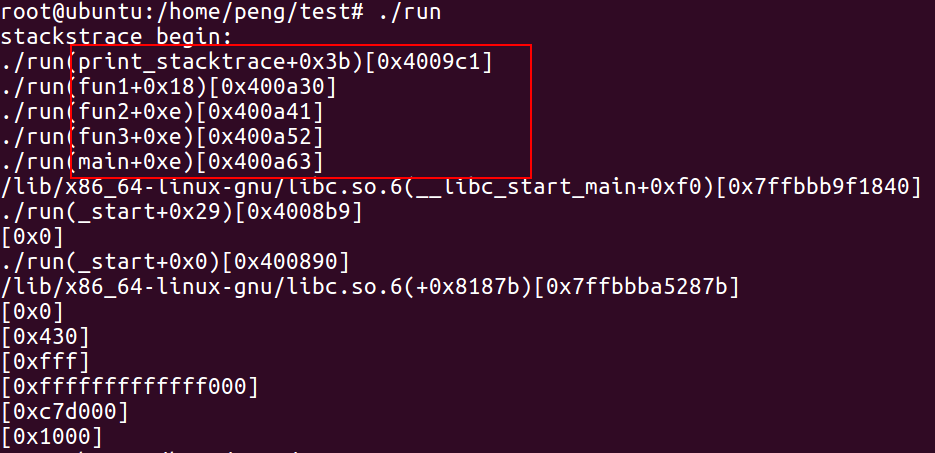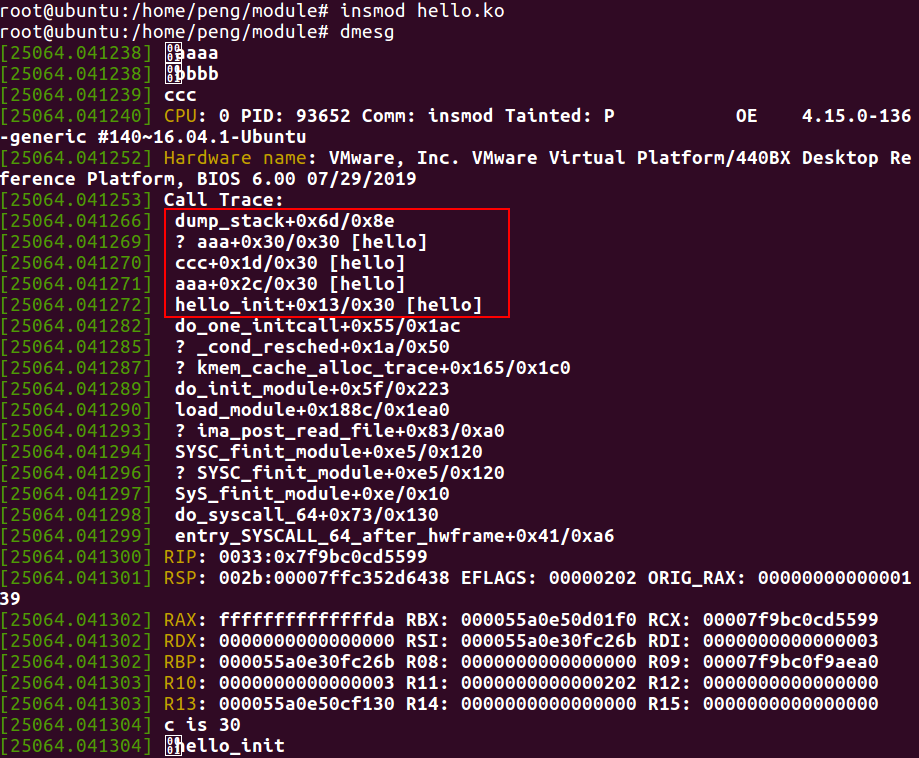linux:如何查看函数被哪些函数调用过?
#if 0
char ** stacktrace = backtrace_symbols(array, stack_num);
for (int i = 0; i < stack_num; ++i)
{
printf("%s", stacktrace[i]);
}
free(stacktrace);
#endif
}
void fun1()
{
printf("stackstrace begin:");
print_stacktrace();
}
void fun2()
{
fun1();
}
void fun3()
{
fun2();
}
int main()
{
fun3();
}
编译运行gcc编译时加上-rdynamic参数,通知链接器支持函数名功能(不加-rdynamic参数则无函数名打印):
gcc 123.c -o run -rdynamic -g
执行结果:

4. 补充 address2line
同一个函数可以在代码中多个地方调用,如果我们只是知道函数,要想知道在哪里调用了该函数,可以通过address2line命令来完成,我们用第2步中编译出来的test2来做实验(address2line的-f选项可以打出函数名, -C选项也可以demangle):

address2line
三、内核代码中如何打印函数栈?
在Linux内核中提供了一个可以打印出内核调用堆栈的函数 dump_stack()。
该函数在我们调试内核的过程中可以打印出函数调用关系,该函数可以帮助我们进行内核调试,以及让我们了解内核的调用关系。
1. 头文件
该函数头文件为:
#include <asm/ptrace.h>
使用方式:
直接在想要查看的函数中添加
dump_stack();
2. 举例
测试代码如下:hello.c
1 #include <linux/init.h>
2 #include <linux/module.h>
3 #include <asm/ptrace.h>
4
6 MODULE_LICENSE("GPL");
7 MODULE_AUTHOR("PD");
8 void aaa(int a);
9 void bbb(int b);
10 void ccc(int c);
11
14 void ccc(int c)
15 {
16 printk(KERN_SOH"cccc ");
17 dump_stack();
18 printk("c is %d",c);
19 }
20 void bbb(int b)
21 {
22 int c = b + 10;
23 printk(KERN_SOH"bbbb ");
24 ccc(c);
25 }
26 void aaa(int a)
27 {
28 int b = a + 10;
29 printk(KERN_SOH"aaaa ");
30 bbb(b);
31 }
32
34 static int hello_init(void)
35 {
36 int a = 10;
37
38 aaa(a);
39 printk(KERN_SOH"hello_init ");
40
41 return 0;
42 }
43 static void hello_exit(void)
44 {
45 printk("hello_exit ");
46 return;
47 }
48
49 module_init(hello_init); //insmod
50 module_exit(hello_exit);//rmmod
Makefile
ifneq ($(KERNELRELEASE),)
obj-m:=hello.o
else
KDIR :=/lib/modules/$(shell uname -r)/build
PWD :=$(shell pwd)
all:
make -C $(KDIR) M=$(PWD) modules
clean:
rm -f *.ko *.o *.mod.o *.symvers *.cmd *.mod.c *.order
endif
编译安装模块
dmesg -c
make
insmod hello.ko
【注意】都在root权限下操作

结果
可以看到在函数ccc中使用dump_stack()打印出了ccc的函数调用栈。
在内核开发中,我们可以使用dump_stack()来打印相关信息,同时在内核源码学习中也可以用来了解函数调用关系。

最新活动更多
-
3月27日立即报名>> 【工程师系列】汽车电子技术在线大会
-
4月30日立即下载>> 【村田汽车】汽车E/E架构革新中,新智能座舱挑战的解决方案
-
5月15-17日立即预约>> 【线下巡回】2025年STM32峰会
-
即日-5.15立即报名>>> 【在线会议】安森美Hyperlux™ ID系列引领iToF技术革新
-
5月15日立即下载>> 【白皮书】精确和高效地表征3000V/20A功率器件应用指南
-
5月16日立即参评 >> 【评选启动】维科杯·OFweek 2025(第十届)人工智能行业年度评选











 分享
分享















发表评论
请输入评论内容...
请输入评论/评论长度6~500个字
暂无评论
暂无评论